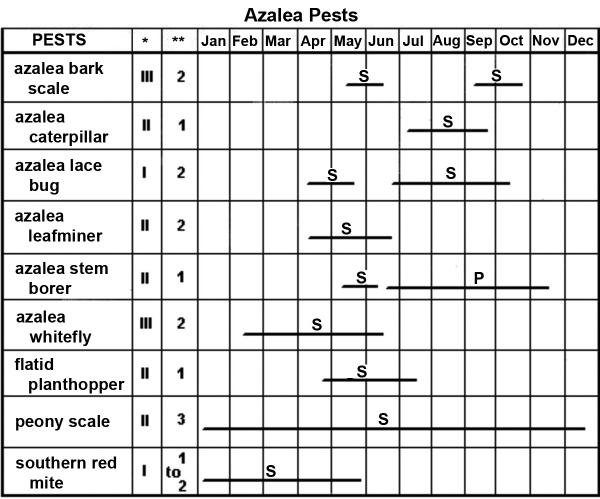Caution
This information was developed for North Carolina and may not apply to other areas.
Please click on the thumbnail to enlarge it, if needed.
Jump to the table legend.
Legend
* Degree of importance of pest: I=Important pest, high probability of occurrence, II=Treat as needed: III=Occasional pest, treat when detected.
** Number of applications needed for most effective control. It is usually best to wait 10 to 14 days between applications in cool weather and 7 to 10 days between applications in warm weather.
G = granular; P = prune out infested twigs or branches; S = spray application.
Azalea Pest Management Calendar
| Pests | Degree of Importance of Pest* | Number of applications** | Jan | Feb | Mar | Apr | May | Jun | Jul | Aug | Sep | Oct | Nov | Dec |
|---|---|---|---|---|---|---|---|---|---|---|---|---|---|---|
| azalea bark scale | III | 2 | Spray Application | Spray Application | Spray Application | Spray Application | ||||||||
| azalea caterpillar | II | 1 | Spray Application | Spray Application | Spray Application | |||||||||
| azalea lace bug | I | 2 | Spray Application | Spray Application | Spray Application | Spray Application | Spray Application | |||||||
| azalea leafminer | II | 2 | Spray Application | Spray Application | Spray Application | |||||||||
| azalea stem borer | II | 1 | Spray Application | Spray Application/ Prune |
Prune out infested twigs or branches | Prune out infested twigs or branches | Prune out infested twigs or branches | Prune out infested twigs or branches | Prune out infested twigs or branches | |||||
| azalea whitefly | III | 2 | Spray Application | Spray Application | Spray Application | Spray Application | Spray Application | |||||||
| flatid planthopper | II | 1 | Spray Application | Spray Application | ||||||||||
| peony scale | II | 3 | Spray Application | Spray Application | Spray Application | Spray Application | Spray Application | Spray Application | Spray Application | Spray Application | Spray Application | Spray Application | Spray Application | Spray Application |
| southern red mite | I | 1 to 2 | Spray Application | Spray Application | Spray Application | Spray Application | Spray Application |
* Degree of importance of pest: I=Important pest, high probability of occurrence, II=Treat as needed: III=Occasional pest, treat when detected.
** Number of applications needed for most effective control. It is usually best to wait 10 to 14 days between applications in cool weather and 7 to 10 days between applications in warm weather.
G = granular; P = prune out infested twigs or branches; S = spray application.
Other Resources
- Azalea Bark Scale. Baker, J. R. 2019 (revised). PDIC Factsheets, NC State Extension Publications.
- Azalea Caterpillar. Baker, J. R. 2020 (revised). PDIC Factsheets, NC State Extension Publications.
- Azalea lace bug. Baker, J. R. 2023 (revised). PDIC Factsheets, NC State Extension Publications.
- Azalea Leafminer. Frank, S. 2019 (revised). Entomology Insect Notes, NC State Extension Publications.
- Azalea Stem Borer. Frank, S. and J. R. Baker. 2020 (revised). Entomology Insect Notes, NC State Extension Publications.
- Azalea Whitefly. Baker, J. R. 2021 (revised). PDIC Factsheets, NC State Extension Publications.
- Planthoppers. Frank, S. et al. 2019 (revised). Entomology Insect Notes, NC State Extension Publications. https://content.ces.ncsu.edu/planthoppers
- Southern Red Mite and Spruce Spider Mite. Frank, S. et al. 2019 (revised). Entomology Insect Notes, NC State Extension Publications.
- Insect and Related Pests of Shrubs. Baker, J. R. ed. 1980. NC Agricultural Extension Service publication AG-189. 199 pp.
- North Carolina Agricultural Chemicals Manual
- Extension Plant Pathology Publications and Factsheets
- Horticultural Science Publications
- Search for more information on insects from NC State Extension
Find your local N.C. Cooperative Extension center
This Insect Note has not been peer reviewed.
Publication date: May 17, 2018
Reviewed/Revised: Aug. 29, 2019
Recommendations for the use of agricultural chemicals are included in this publication as a convenience to the reader. The use of brand names and any mention or listing of commercial products or services in this publication does not imply endorsement by NC State University or N.C. A&T State University nor discrimination against similar products or services not mentioned. Individuals who use agricultural chemicals are responsible for ensuring that the intended use complies with current regulations and conforms to the product label. Be sure to obtain current information about usage regulations and examine a current product label before applying any chemical. For assistance, contact your local N.C. Cooperative Extension county center.
N.C. Cooperative Extension prohibits discrimination and harassment regardless of age, color, disability, family and marital status, gender identity, national origin, political beliefs, race, religion, sex (including pregnancy), sexual orientation and veteran status.

